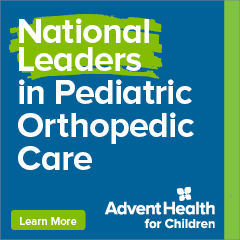Spreading the Word
As Mental Health Awareness Month arrives, local organizations want residents to know that help is available and there’s no shame in asking for it.

With a lengthy career in health care, including her current role as the CEO of Central Florida Behavioral Hospital, Vickie Lewis knows as well as anyone that “mental health can touch anyone.” That is especially the case in Florida, where the Centers for Disease Control and Prevention note that more than 32% of adults experience symptoms of anxiety or depression, above the national average, with many of those failing to have their issues addressed for a variety of reasons, including workforce shortages in the field.
With those statistics in mind, Mental Health Awareness Month, recognized every May, takes on an added significance in the mission to bring these topics to the forefront and to ensure that those in need have access to critical, life-saving services. Orlando Family Magazine took the opportunity to speak with leaders from two of the most influential organizations in the area—Lewis and Lisa Kroger, an executive director at Devereux Advanced Behavioral Health—to learn more about the available care and what this month means to them.
Kroger oversees Devereux’s Orlando-based mobile crisis services as well as its children’s mental health programs locally, while Lewis leads a hospital that provides inpatient and outpatient services for both adults and adolescents.
Although the stigma long associated with mental health has started to lift in recent years, do you still feel that Mental Health Awareness Month is an important time and can help the general public to be more accepting of people suffering?
Vickie Lewis: “I certainly think the stigma is less than it used to be, but there is still a stigma attached, and anything that we can do to cause or call awareness to individuals staying healthy mentally, I think it’s important. Being aware of signs and symptoms can save someone’s life. It’s not just the stigma, but keeping an awareness of how important it is to watch for any indicators with our friends, our coworkers [and] our loved ones is helpful. For us as individuals too, [we should] encourage people to get help when they need it and not wait.”
Lisa Kroger: “We must remind ourselves and our loved ones that ‘it’s OK to not be OK,’ and to seek help for yourself or for others in times of need. Mental Health Awareness Month provides an opportunity to begin those discussions, to learn more about signs that someone may need support, and even becoming more self-aware of how to manage our own well-being.”
Does your organization hold any events or do anything in particular to mark the month?
VL: “The major thing that we do is support the NAMIWalk—the National Alliance for the Mentally Ill. We’re a presenting sponsor for the NAMIWalk and that’s a fairly significant walk in our community. A lot of people attend, and to be a major sponsor certainly shows that we support the efforts of the community in making people aware.”
LK: “Devereux works alongside our community and behavioral health care partners to participate in public awareness events, provide complimentary training and share resources that remind people of resources available in our local community and how to access support.”
One of the positive recent developments is that more people are seeking help for mental health issues, but on the flip side, some have had trouble accessing treatment. How do you think this problem can be addressed?
VL: “I think the more education we can do about where our services are in the community and how to access them is more relevant than saying it’s hard to access. Most people don’t even realize that they have health care that’s got benefits for psychiatric services, outpatient services, therapy, inpatient services—whatever the need of an individual is. Educating people about what benefits they already have personally and then secondly, what is in the community that serves as resources? We have mental health agencies, we have many support groups within the community, and then of course there are hospitals like ours that have the inpatient services and outpatient services, depending on the level of care someone needs. So it’s [creating] an awareness of what’s already available and then how to access it.”
LK: “We work with local and state leaders to identify solutions that will minimize barriers to accessing services and ensure specialized services are in place to be available when they are in critical need, such as our mental health mobile response teams—which are available 24 hours per day/seven days per week, at no cost to the recipient by dialing 211—and our partnership with Orange County Sheriff’s Office that allows us to provide support to the community in a co-responder approach with law enforcement in crisis situations that meet this criteria.”
Is collaboration among different care providers important to direct people to the services they need?
VL: “It is. A community is a team, and when someone identifies that the need in front of them with an individual or a patient is outside of their own scope, then referring to someone else is always the appropriate way to do things. We find that we have all of our primary care physicians in the community who use us as a resource: pediatricians, family practices, internal medicine, often even obstetrics if someone comes into their office and has post-partum depression. Of course, we also have the law enforcement agencies that utilize us daily. We have specialty hospitals in the community that are child facilities and utilize this hospital for psychiatric services, and so do the other major players in the community. We’re probably the No. 1 referral source within the community for inpatient services.”
What was your personal inspiration for getting involved in this type of work and do you find it rewarding?
VL: “I’ve been a nurse for a very long time so I’ve always had a heart for health care, regardless of the type of need that someone was seeking from a medical or psychiatric standpoint. I feel like every individual can have a purposeful life, and for people to be crippled from mental health issues and not be able to fulfill their dreams is a heartbreaking thing for me. So I’ve really spent a majority of my health care career working in this arena to make sure that there are services in the community, that we’ve got a good, quality facility in the community, and that people are available to provide the care that they need to. Mental health can touch anyone … so the more that we have places for people to come and get treatment so they can get better and have a normal, happy life, that’s certainly a passion of mine. It’s a mission and a calling, and it’s not for everyone, but it has been for me.”
LK: “Coming from a family of educators and social workers, I was drawn to the healing field. I always knew I wanted to help young people, to empower them to achieve their potential. I started a career in the mental health field as a college student. More than 30 years later, I am still just as committed to making a difference and have learned that effective collaboration enhances the ability to make a broad impact. I find it extremely rewarding to see the children and families we work with achieve success and go on to live happy and fulfilling lives.”
Resources
Central Florida Behavioral Hospital
Orlando | (407) 370-0111
CentralFloridaBehavioral.com
Central Florida Cares Health System
Orlando | (407) 985-3560
CentralFloridaCares.org
Devereux Advanced Behavioral Health
Orlando | (800) DEVEREUX
DevereuxFL.org
OPA Behavioral Health
Multiple locations | (407) 851-5121
OPABH.com









